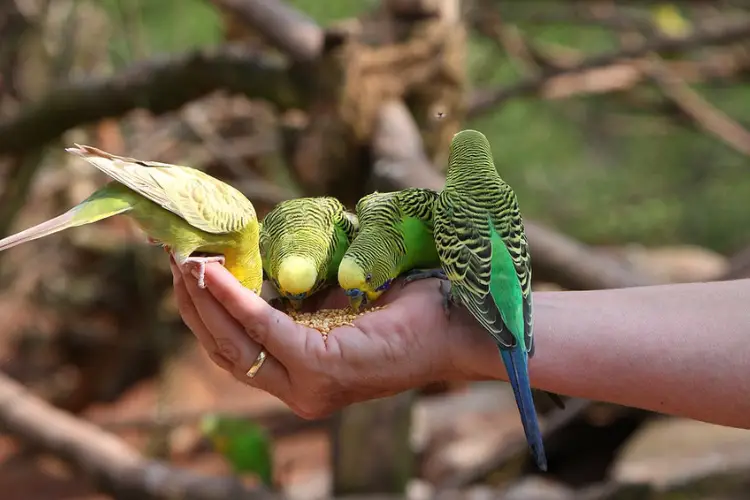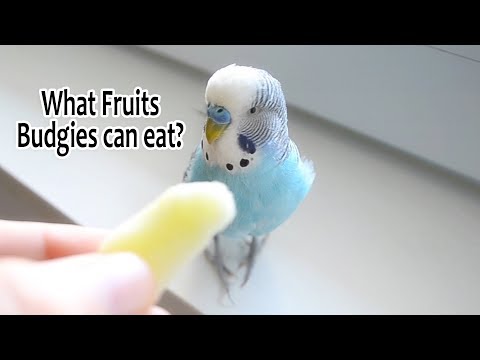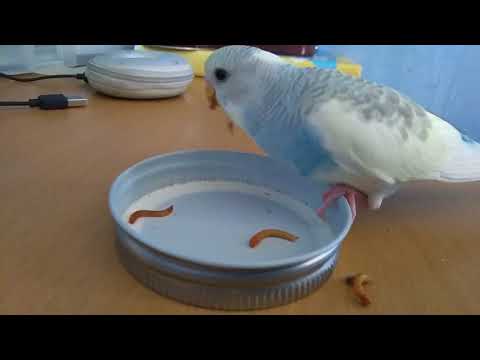Budgies are omnivorous birds, meaning they can eat many plants and animal matter. Now, if you are planning on keeping these birds as pets, you probably are curious to know the answer to many questions.
Questions like what do budgies eat? And what don’t they eat? Captive budgies eat various seeds, pellets, fruits, vegetables, nuts, and herbs to stay healthy. Seed mixes comprise the most significant portion of the budgie diet, approximately 60-80%. However, not all fruits and veggies are safe for these birds, such as avocados, onions, and garlic.
But how much do pet budgies eat daily, and what veggies can they safely eat? In this post, you will discover the complete budgie food list so you know what your pet birds can and cannot eat.
How Much Do Budgies Eat A Day?
A budgie diet comprises fresh fruits, greens, and veggies supplemented with seed mixes or pellets. As for the seeds and pellets, your parakeets should eat about 1.5 to 2 tablespoons daily, based on your bird’s size. This should be equivalent to around 60-80% of their food.
Pet birds must eat more seeds because they contain all the essential nutrients they need. Therefore, your birds are unlikely to suffer from nutrient-related problems like goiter, abnormal feathers, and infections.
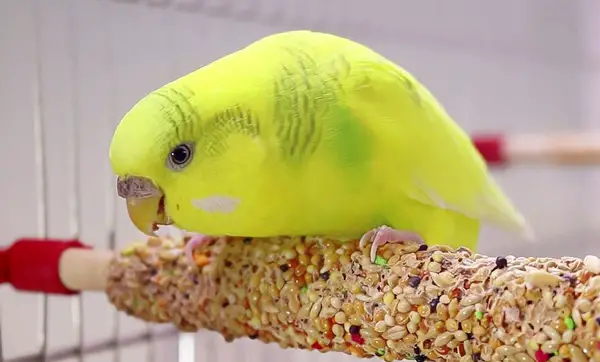
However, you must not exceed 2 tablespoons because feeding your budgies too many seeds could lead to overweight issues. And due to the obesity, your birds could suffer from an increased risk of diseases like:
- Fatty liver
- Respiratory distress
- Arthritis
- Diabetes
Regarding fruits, vegetables, and greens, you should only offer them to your parakeets as treats. Therefore, they should only make up 20-25% of what you feed your birds daily. This is because your birds may experience upset stomachs and diarrhea from overeating these budgie treats.
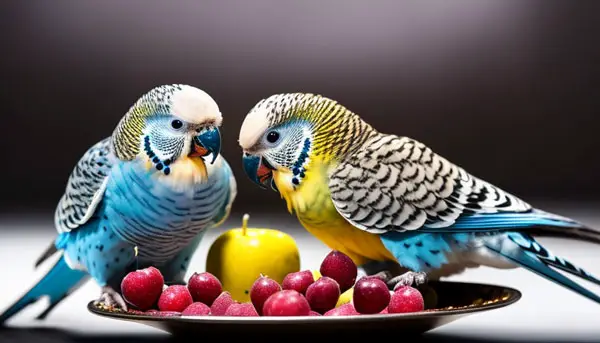
Additionally, your budgie can eat family meals occasionally as long as the food is healthy, natural, and with no added salt. In this case, you only give your bird a thumbnail amount of the food to minimize gastrointestinal issues.
What Veggies Can Budgies Eat?
Fresh vegetables are an excellent source of nutrients for your budgies, making them a great addition to your bird’s diet. Below is a budgie food list of the healthiest veggies to feed your parakeets, grouped into various categories.
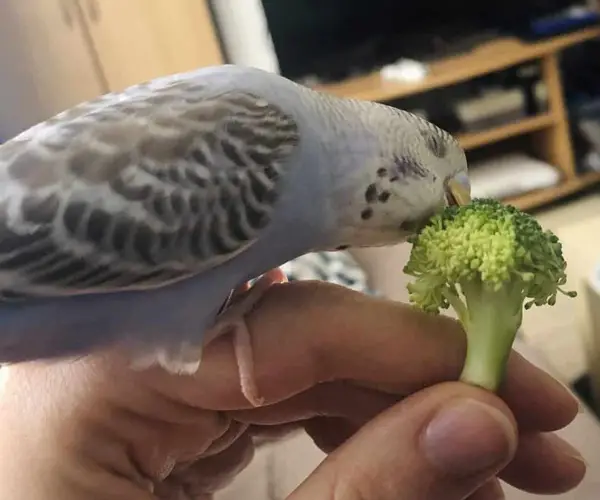
1. Leafy green vegetables
These are types of vegetables with edible plant leaves. Your budgies can eat leafy greens like spinach, kale, collard greens, dandelion greens, lettuce, Bok choy, mustard greens, and Swiss chard. Besides being low in calories, these greens are packed with high fiber, vitamins, and minerals.
2. Cruciferous vegetables
These types of veggies are rich in vitamins C, E, and K, folate, fiber, and several carotenoids essential to budgies’ health. Your pet birds can eat cruciferous vegetables like broccoli, cabbage, cauliflower, brussels sprouts, and arugula.
3. Legumes
Legume vegetables are typically high in folate, magnesium, iron, and potassium. In addition, they contain no cholesterol and are low in fat. Some legumes your pet birds can eat are green beans, peas, and lentils.
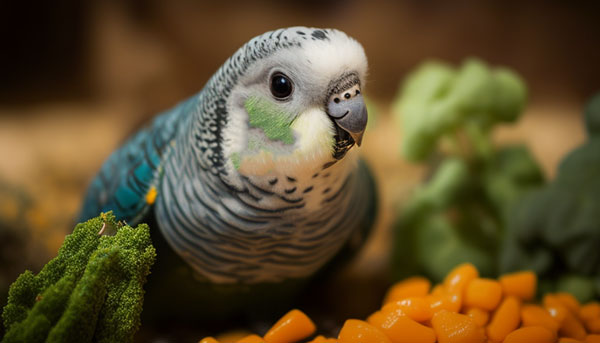
4. Marrow vegetables
Budgies can safely eat marrow vegetables such as cucumber, butternut squash, courgette, zucchini, and pumpkin. Besides improving your budgie’s digestion, these veggies support heart health in parakeets.
5. Stem veggies
Stem vegetables can help increase your bird’s vitamin, mineral, and nutrient intake. Some stem veggies your parakeets can eat are asparagus, celery, rhubarb, and kohlrabi.
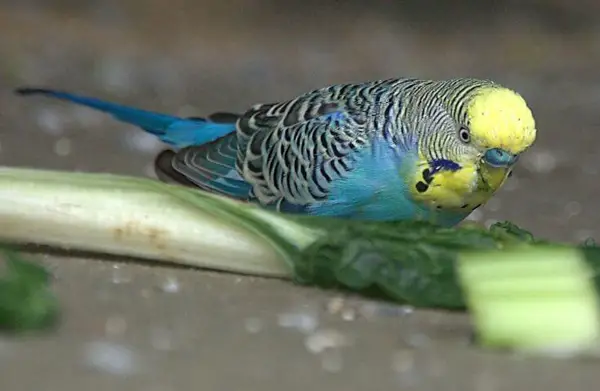
6. Root vegetables
Root veggies are low in calories and fat but rich in carotenoids, antioxidants, and fiber. Budgies can eat root vegetables like sweet potatoes, carrots, yams, potatoes, ginger, parsnips, and rutabagas.
Also read: Clipping Budgie Wings
Veggies To Avoid
While vegetables are healthy food for budgerigars, some varieties are not safe for them to eat. These include:
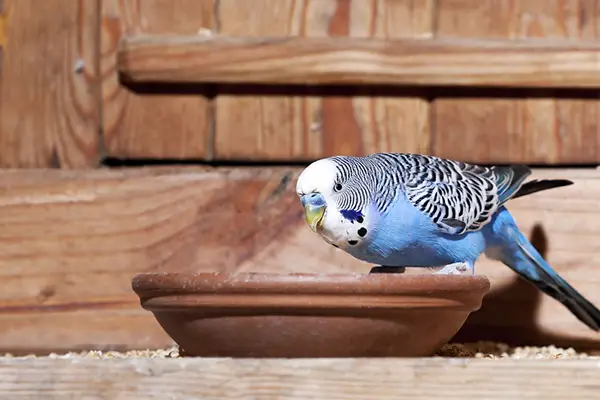
1. Leaves and tops of rhubarb
The stems of rhubarb are safe for your pet birds to eat. However, the leaves and tops of this vegetable contain 570 – 1,900 mg oxalate crystals per 100 grams. Oxalic acid is known to inhibit calcium absorption in budgies.
2. Cooked or raw onions
Onions have sulfur compounds. These compounds can cause the rupture of red blood cells and irritate your bird’s mouth and esophagus lining, leading to ulcers.
3. Garlic
Garlic is rich in a natural sulfur-containing compound called allicin. This compound may help ease inflammation. But when consumed in large quantities, it could increase your budgie’s risk of bleeding by preventing blood clotting.
4. Canned veggies
Most canned vegetables are very high in sodium. Unfortunately, any budgie food containing too much sodium may lead to dehydration, exaggerated thirst, and kidney failure in birds.
5. Mushrooms
Although not an actual vegetable, raw or cooked mushrooms are not safe for budgies to eat. They may cause digestive issues since they are a type of fungus by releasing unfriendly digestive enzymes.
What Fruits Do Budgies Eat?
Fruits are excellent budgie treats. However, your pet birds should only eat fresh fruits and in moderation, including:
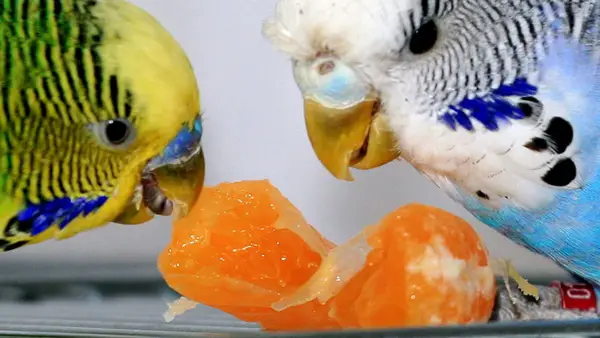
1. True and false berries
Besides being high in antioxidant polyphenols like most fruits, berries are also rich in vitamin C and fiber, essential for budgies. Your parakeets can eat strawberries, bananas, blueberries, pineapples, kiwis, raspberries, pomegranates, watermelons, grapes, and blackberries.
2. Citrus fruits
Budgies can eat citrus fruits like oranges, tangerines, grapefruit, kumquats, and clementines once in a while. These fruits are a proven immune booster for pet birds.
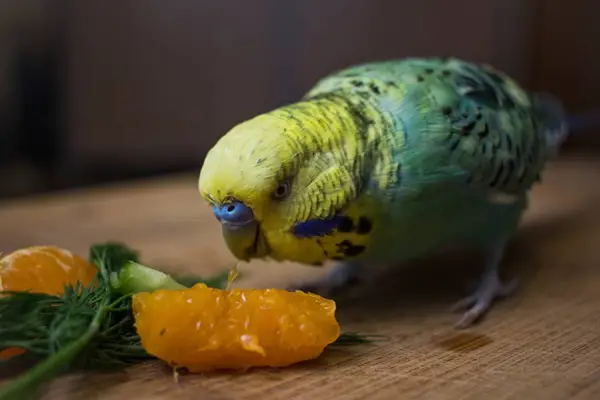
3. Drupes
Drupes are types of fruits containing a single seed. These budgie treats may help support a healthy heart, eyesight, feathers, and digestion in birds. Some safe drupes your bird can eat are peaches, cherries, nectarines, plums, coconuts, apricots, and dates.
4. Fruits that are vegetables
You can give your budgies a variety of fruits considered to be vegetables, such as peppers, tomatoes, and cucumbers. Tomatoes are also a good source of vitamin A, which is known to support healthy feathers.
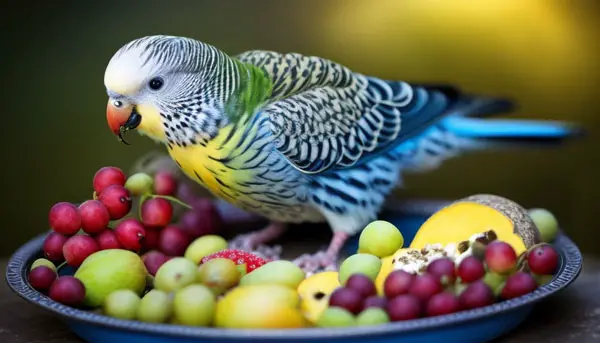
5. Tropical fruits
These types of fruits are rich in antioxidants helping improve the immunity of your budgies. Some tropical fruits to add to your budgie diet are pomegranate, papayas, jackfruit, mangoes, passion fruit, dragon fruit, and guavas.
6. Pomes
Pome fruits have several tiny seeds at the core, which are not safe for budgies to eat. However, your pet birds can eat the flesh of pome fruits such as apples and pears. These fruits are excellent sources of vitamin C and fiber but are low in sodium, fat, and cholesterol.
Below is a video of the different fresh fruits you can add to your budgie diet:
What Fruits Can Budgies Not Eat?
Budgies can safely eat a variety of fruits but in small amounts. However, your birds cannot eat the seeds and pits of fruits like apples, pears, cherries, apricots, nectarines, peaches, and plums. They can only eat the flesh of these fruits.
Do you know why? The seeds and pits of the above fruits contain a compound called amygdalin. When your budgies ingest the mixture in large amounts, it converts to toxic cyanide. Consequently, your parakeets may experience:
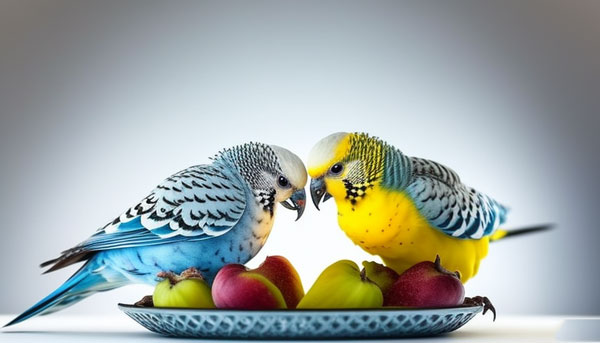
- Falling blood pressure
- Headaches and fever
- Nausea and vomiting
- Joint and muscle pains
- Lethargy and excessive thirst
Additionally, avocado flesh, seed, stem, and leaves are not safe for budgies to consume. This fruit contains persin compounds, which are toxic to pet birds but not humans. Persin poisoning may lead to difficulty breathing and sudden death in birds.
Seeds Budgies Can and Cannot Eat
Seeds are every budgie’s favorite food because they also eat them in the wild. You can buy ready-made seed mixes from a pet shop. Or, you could prepare the seeds so your budgies can eat them separately.
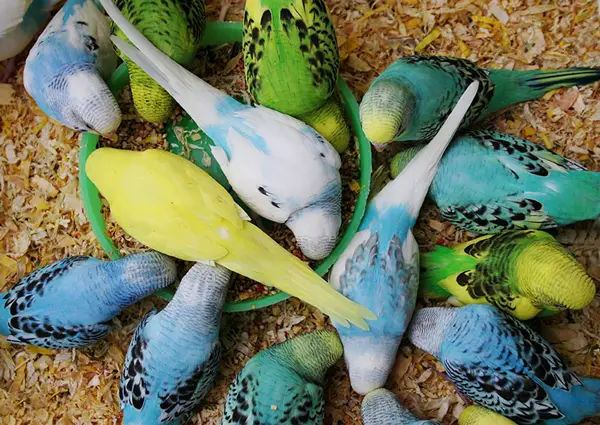
However, like with fruits and veggies, your parakeets must consume these seeds in moderation from time to time. Below are some safe seed types your pet birds can eat:
- Sunflower seeds
- Hemp seeds
- Sesame
- Millet
- Niger and basil seeds
- Pumpkin
- Flax and poppy seeds
- Rapeseed
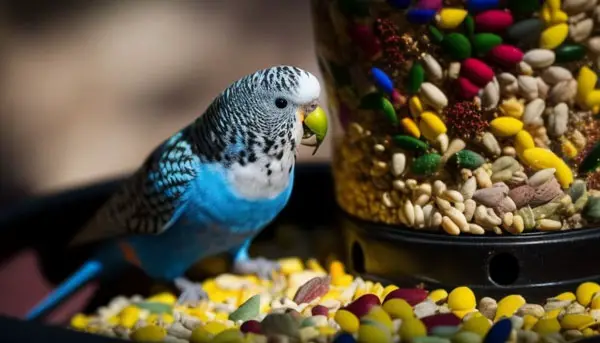
But what seeds should budgies not eat? The seeds of fruits like apples, nectarines, cherries, peaches, plums, and pears contain a toxic compound called amygdalin. This compound can lead to sudden death when your birds consume the seeds excessively.
What About Nuts?
Natural and raw nuts are also excellent treats for budgies. Your pet birds may suffer from malnourishment if you feed them an all-seed diet only without a mix of nuts. But what nuts are safe for your parakeets?
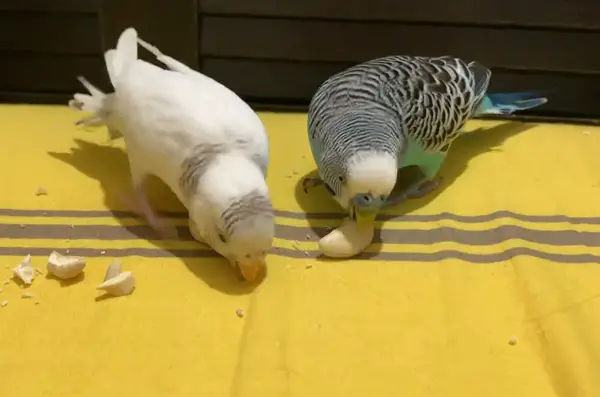
1. Walnuts
Walnuts contain heart-healthy monounsaturated fats, omega-3 fatty acids, and vitamin E. This makes them any budgies favorite food. However, you must crack the nuts for your birds because the shell is quite hard.
2. Pistachios
Budgies can eat raw and unsalted pistachios in limited amounts. They are a rich source of proteins, fiber, antioxidants, vitamins, and nutrients your birds need to stay healthy.
3. Brazil and hazelnuts
Like other nuts, Brazil and hazelnuts contain essential minerals, vitamins, and other nutrients to boost your budgie’s immunity and heart health. Even better, these nuts contain neither cholesterol nor sodium but only healthy fats.
4. Peanuts
You can offer shelled or unshelled peanuts to your pet parakeets, provided they are not roasted. Your birds can also safely eat natural peanut butter with zero additives or preservatives.
5. Almonds and pecans
Although not authentic nuts, almonds, and pecans are healthy snacks for your budgies. They are naturally low in sodium but high in unsaturated fats, protein, and calcium.
Nuts are generally safe for budgies when eaten raw. However, your budgies must avoid salted and seasoned nuts. Your birds may suffer from dehydration, excessive thirst, and kidney failure due to consuming too much salt.
Can They Eat Herbs?
Yes. Budgies can eat various fresh or dried herbs in small amounts and occasionally. They offer a range of health benefits to pet birds. For instance, most herbs are fiber-rich, making them excellent for your budgie’s digestion and bowel health.
Additionally, herbs help support heart health while reducing the risk of cardiovascular diseases in parakeets. This is because they are rich sources of antioxidants. Besides that, herbs pack anti-inflammatory and anti-diabetic properties.
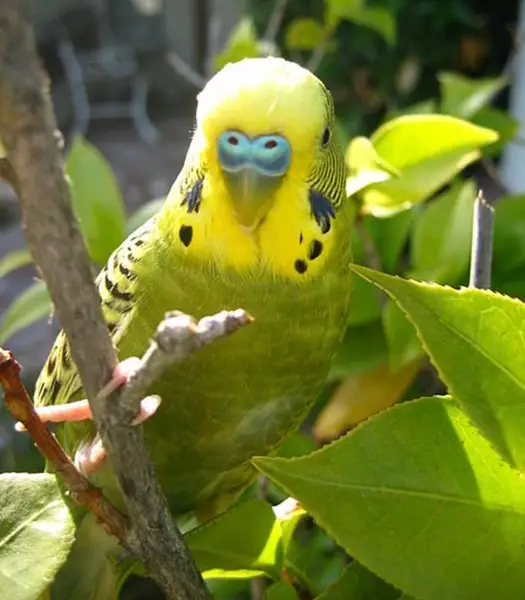
So, what herbs can budgies eat? Your birds can eat the leaves, seeds, and roots of herbs like parsley, basil, watercress, purslane, cloves, mint, and dill. These herbs don’t contain any harmful compounds toxic to budgies. Budgies can also consume aromatic herbs like:
- Lemon balm
- Rosemary and arugula
- Lavender
- Peppermint and cilantro
- Bay laurel
- Thyme
- Oregano and sage
- Turmeric
That said, herbs from the allium family are not safe for parakeets to eat. These include chives, scallion (spring onions), and shallots. These herbs are loaded with organic sulfur compounds, which may induce symptoms like shortness of breath in birds. Additionally, chives contain fructans that may lead to upset stomach, constipation, and diarrhea in budgies.
What About Insects?
Budgies are omnivores. Therefore, they can digest insects besides seeds, fruits, veggies, nuts, and herbs. After all, these parrot species eat flying insects and other bugs in the wild for protein and energy.
While you don’t have to feed insects to your captive budgies, they can be a great addition to your birds’ diet. Bugs are rich in protein needed for your bird’s healthy feather, muscle, and bone development. Insects are also loaded with calcium, a mineral essential for breeding budgies. This is because it helps support the healthy production of eggshells.
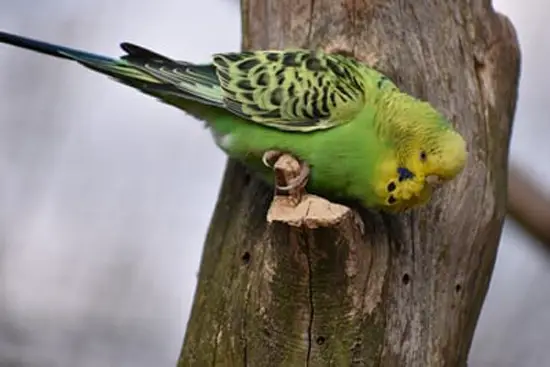
But what types of insects are safe for your parakeets to eat, and which should they avoid? Well, your companion birds can eat:
- Ants and crickets
- Moths and flies
- Midges
- Weevils
- Caterpillars and aphids
- Beetles and grasshoppers
- Small spiders
- Dried or live mealworms
Watch this short video of a budgie enjoying live mealworms:
However, some insects are not safe for your birds to eat. These include insects that you capture outdoors. This is because such bugs may carry deadly pesticides or parasites, jeopardizing your pet’s health. In other words, you should only feed your budgie insects sourced from creditable pet stores.
What Do Baby Budgies Eat?
For budgies that are less than three weeks old, you should feed them formula and powdered food. But once they are over 4 weeks, they can eat the same types of food their adult counterparts can eat but in smaller quantities. After all, baby birds’ stomachs are relatively small in size.
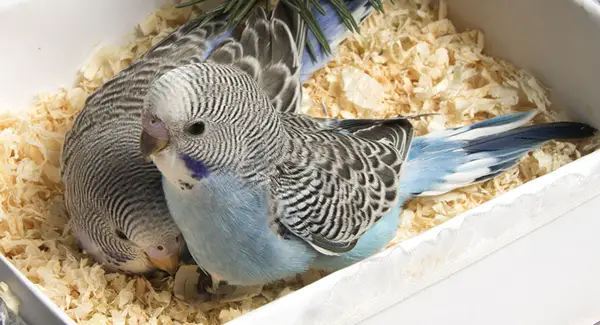
However, young budgies require a diet richer in protein than mature parakeets for proper development. Below is a list of foods your baby pet birds can eat.
Seeds and pellets
Baby parakeets can start eating various seeds and pellets at around 4 to 6 weeks. They should make up the largest of a baby budgie’s diet. But for ease of eating, you should give your birds soaked and sprouted seeds.
Your baby parakeets can eat sunflower, millet, canary, safflower, pumpkin, and Niger seeds. One tablespoon of grains per day should be enough.
Fruits and vegetables
When your budgies are about 4 weeks old, you can introduce them to fresh fruits and veggies. Unlike adult budgies, the diet of your baby parakeets should comprise only 5 to 10% fruits and veggies.
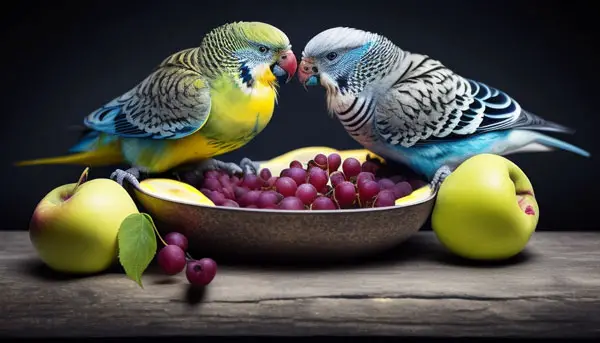
You can feed them kale, broccoli, strawberries, lettuce, parsley, spinach, and other fruits that mature birds can safely eat.
Nuts
Different nuts are full of nutrients your baby budgies won’t quickly get from anywhere else. However, you must deshell the nuts and crush them into small sizes. This is because the nuts can be a choking hazard for young budgies. Besides peanuts, baby parakeets can eat hazelnuts, Brazil nuts, pistachios, and walnuts.
Herbs
Kitchen herbs, including thyme, rosemary, parsley, oregano, coriander, and mint, are also an excellent addition to the baby budgie diet. These herbs contain several nutrients essential for enhancing the immune system of baby parakeets. However, your birds can only eat a small amount occasionally.
Are There Any Other Foods They Can And Cannot Eat?
The complete budgie food list comprises seed mixes, nuts, herbs, fruits, and vegetables. Even so, there are other foods your budgies could eat, including:
Pellets
Sometimes, you can let your budgies eat pellets instead of seed mixes. Pellets combine seeds, fruits, grains, veggies, and other nutritious ingredients. Therefore, your birds are sure to get the right balance of vitamins, minerals, proteins, amino acids, and fats that they need.
Eggs and egg food
Budgies can eat eggs, including the white part, shells, and the yolk, whether boiled, scrambled, or raw. These two budgie treats are rich in protein, providing an energy boost to your birds, especially when molting and nesting. However, your companion friends should only eat eggs or egg food once or twice weekly as a snack.
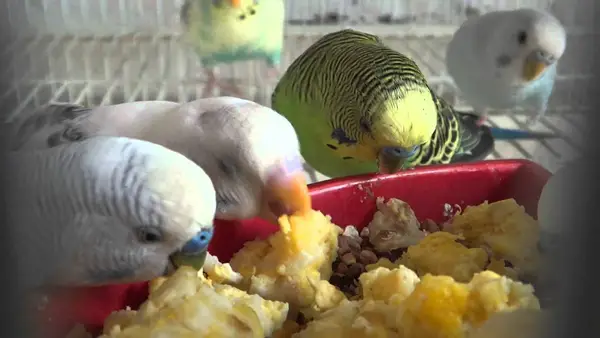
Weeds
Besides herbs, budgies can eat weeds like chickweed, milk thistle, dandelions, and seeding grasses. Chickweed contains high levels of vitamin A to support your bird’s healthy immunity.
On the other hand, dandelion roots help reduce inflammation, while the flowers are rich in antioxidants. Milk thistle may help treat liver disease in budgies.
Whole grain bread
Your pet budgies can occasionally take a bite or two of whole grain bread. While it is not actively harmful, bread is low in essential minerals and vitamins. It is only high in carbohydrates. However, your companion birds should only eat bread free from additives or preservatives.
Pasta
Most budgies love pasta and can eat it cooked or uncooked. Pasta is a healthy snack for your feathery friends because it contains energy-enhancing carbohydrates.
Regarding the foods to avoid, there is quite a number that can be toxic to your feathered friends. These include:
Alcohol and caffeinated products
You should not offer your budgies alcohol and caffeinated beverages, including soft drinks, tea, or coffee. These beverages can increase your bird’s heart rate and difficulty breathing by stimulating the central nervous system.
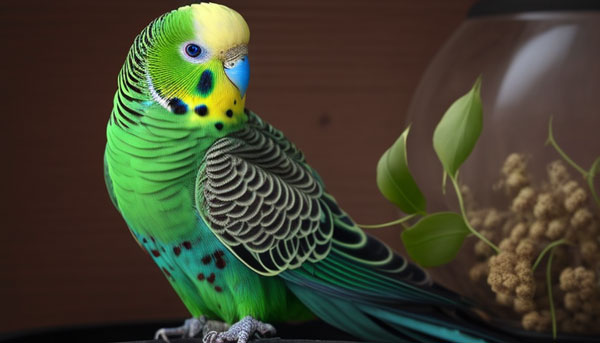
Chocolate
Budgies should not eat even a little chocolate or chocolate-containing foods. This is because chocolate contains an alkaloid compound called theobromine, which can upset your budgie’s stomach. The mix may also lead to seizures and increased heart rate.
Salty treats
Too much salt may alter your budgie’s electrolyte and fluid balance. As a result, your parakeets may suffer from dehydration, excessive thirst, kidney failure, and even death. Therefore, you must avoid budgie treats like salty chips, pretzels, crackers, and popcorn.
Sugar-free candies
Unfortunately, sugar-free candies contain a compound known as xylitol as a sugar alternative. This compound is believed to cause liver failure and seizures in pet birds.
What Do Breeding Budgies Eat?
Once your birds start breeding at around 10 months, giving them the right budgie food is essential. This will help prevent conditions like:
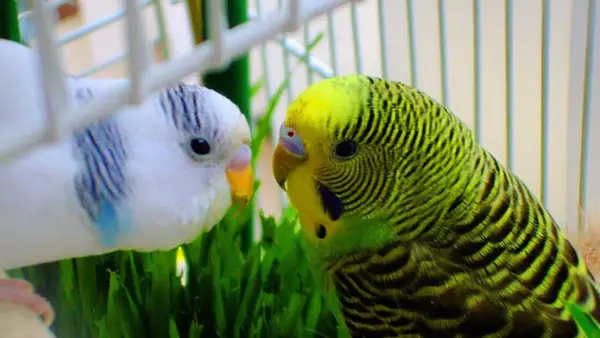
- Infertile eggs
- Egg binding
- Hatching weak chicks
- Abandonment of their baby budgies
- Eating their chicks
That said, here is what to feed budgies during the breeding season. First, you must provide them with a calcium-rich diet for proper egg development. In addition, half of your bird’s diet should consist of vegetables.
Boiled eggs are also an excellent addition to your female budgie’s diet as they are a great protein source. Your breeding birds must also eat plenty of seed mixes.
FAQs
In the section below, we will respond to frequently asked questions concerning the budgie food list.
Yes. There are a few flowers safe for budgies. Therefore, you can keep them in your house. These include the flowers of the dandelion, African violets, sunflowers, roses, hibiscus, marigolds, bottlebrush, and lilac.
If offering your parakeets seeds, pellets, fruits, or vegetables, they should be raw and not cooked. Raw budgie food is believed to contain more nutrients than cooked. However, there is no harm in letting your budgies eat lightly cooked veggies.
Most budgies favorite food is fresh fruits and vegetables. This is because various fruits and veggies boast intriguing flavors, textures, and colors. That is why you must feed your birds these foods in moderation because it is easy for them to overeat.
Outro
The complete budgie food list is quite extensive. Therefore, knowing how much your budgies should eat a day is critical. You just don’t want to under or over-feed your birds.
You also must learn what veggies, fruits, seeds, nuts, and herbs your parakeets can and cannot eat. This is because your pet birds could easily fall ill from eating certain toxic foods.
